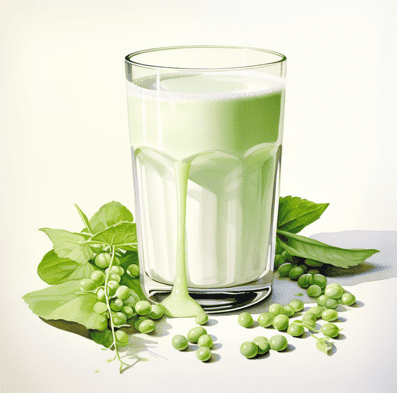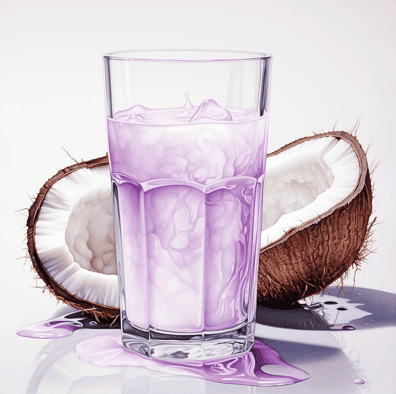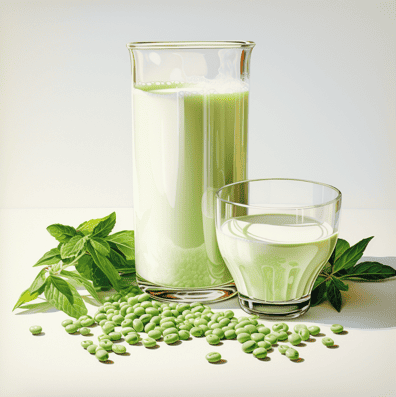
Choosing between plant-based milks are tricky, and now you have narrowed your choice down to coconut milk vs soy milk. Well done! Let’s make your decision easier by understanding their benefits for your skin, waistline, and health, and when it’s best to use coconut milk or best to use soy milk.
Hi, I’m Hazel
I gave up on skincare after years of issues with acne and sensitive skin.
But after going plant-based, my skin cleared up and even started to glow. Now I help women reveal their natural beauty with simple, delicious plant-based food.
I also used to be a nurse, and love nerding out on nutritional science (high-quality science, that is).

As usual, this post is based on the strongest nutritional evidence I could find with a focus on the simplest, most delicious foods
…because who has time to waste on actions that don’t work?
The quick version:
When choosing between coconut milk and soy milk, consider both your skincare and weight management goals. Opt for coconut milk if you’re seeking a radiant, hydrated complexion, and lean towards soy milk for its low-calorie profile that supports weight loss without sacrificing protein. Your choice can impact more than your health—it can transform your beauty routine.
Taste Comparison
Coconut Milk

Known for its creamy texture and rich, slightly sweet flavour, coconut milk is a favourite in both sweet and savoury dishes. It adds a luxurious creaminess that’s perfect for enhancing the depth of curries, soups, and desserts. As one of the beloved plant-based alternatives, it offers a tropical essence that can transform an ordinary meal into an exotic culinary experience.
Note: In this post I’m referring to coconut milk in a carton. This is easily confused with canned coconut milk, especially in recipes.
Canned Coconut Milk: This type is thicker and richer, often used in cooking to add creaminess to dishes such as curries, soups, and sauces. It’s extracted from the grated flesh of mature coconuts and mixed with water, creating a dense, velvety texture that is high in fat and flavour.
Due to its concentrated form, it’s ideal for culinary uses that require a burst of coconut taste and a smooth, thick consistency.
Carton Coconut Milk: Found in the milk aisle, this version is more diluted compared to its canned counterpart. It’s processed to mimic the consistency and usability of dairy milk, making it suitable for drinking, cereal, or light cooking needs.
Carton coconut milk is often fortified with vitamins and minerals, and available in sweetened, unsweetened, flavoured, or unflavoured varieties. It’s a versatile, everyday alternative to traditional milk with a much lighter texture and less pronounced coconut flavour.
Soy Milk
Soy milk is the most popular of non-dairy milks, with its more neutral, subtly nutty flavour. This of course makes it more versatile for a wide range of culinary applications compared to coconut milk.
Recognised as a staple amongst plant-based alternatives, soy milk easily integrates into recipes that require a milk-like liquid without overpowering other ingredients.
Its lighter, smooth consistency works well in protein-rich smoothies, breakfast cereals, and baking.
Skincare Benefits

Coconut Milk for Radiant Skin: Rich in vitamin E and fatty acids, coconut milk is superb for anyone looking to add a touch of glow and hydration to their skin (1). It’s perfect for those dry winter months when your skin craves extra moisture.
Soy Milk for Youthful Elasticity and Cellular Health: Soy milk offers great benefits for maintaining skin elasticity and reducing inflammation thanks to its essential amino acids and impressive protein content.
It’s also rich in spermidine (2). Spermidine has been linked to cellular rejuvenation and may promote skin cell renewal and longevity, which is vital for maintaining youthful, healthy skin. This is ideal for keeping your skin supple and radiant, making it a go-to for your daily beauty regimen.
You may also like:
Is Soy Your Acne Friend or Foe?
Choosing the Right Product: When selecting plant-based milks, it’s crucial to check the nutrition label to ensure you’re getting these added benefits without unwanted extras.
Opt for unsweetened varieties to avoid added sugars, which can negatively impact your skincare goals by exacerbating conditions like acne and premature ageing.
However, plant-based milks often also come enriched with essential nutrients like vitamin D and vitamin B, which can increase the nutritional daily value of your overall diet. So it’s just as import to note what extras come with your plant milks.
Weight Management

When it comes to managing weight, the choice between coconut milk vs soy milk can influence your diet success.
Coconut milk is higher in calories and fat content, which might be useful for those looking to increase their calorie intake in a healthy way.
On the other hand, soy milk may have a lower sugar content and of all the food categories, soy products are associated with the most weight loss (3).
You may also like:
Slimming Down: Is Soy Or Almond Milk Better?
Health Benefits

Heart Health with Soy Milk: Soy milk is excellent for cardiovascular health due to its ability to help manage cholesterol levels and reduce the risk of heart disease (4). Its high protein content supports muscle maintenance, making it a cornerstone for a heart-healthy diet.
Bone Health with Soy Milk: Soy milk also contributes significantly to bone health (5, 6). Its rich supply of calcium and vitamin D helps maintain strong bones, which is crucial in preventing conditions like osteoporosis.
Menopausal Relief with Soy Milk: For women experiencing menopause, soy milk can offer comfort from hot flashes (7). The natural phytoestrogens in soy help modulate body temperature and hormonal fluctuations during menopause.
Cancer Prevention Benefits of Soy Milk: The same phytoestrogens that help with menopausal symptoms in soy milkare also associated with a lower risk of certain types of cancer, such as breast and endometrial cancer (8, 9). These compounds may help regulate hormones that can otherwise contribute to cancer development.
Use of Coconut Milk in Moderation: Coconut milk, while rich in saturated fat, can be part of a healthy diet when used in moderation. However as carton coconut milk is mostly water, this isn’t as big a concern when compared to canned coconut milk.
It’s indulgent texture and flavour enhance culinary experiences, making meals more satisfying, which can help with portion control.
Cooking Recommendations

As milk substitutes, both options are healthier plant-based options for cow’s milk or skim milk.
They both have a creamer texture compared to oat milk, hemp milk, cashew milk, hazelnut milk, and rice milk especially.
Whether you’re whipping up a vegan béchamel sauce with soy milk or a tropical smoothie with coconut milk, you’ll find these alternatives both versatile and delicious.
Perfect Picks for Every Occasion
Culinary Creations
- Rich and Creamy: Use coconut milk for decadent smoothies, soups, and desserts.
- Neutral and Protein-Rich: Opt for soy milk in baking and dishes needing a subtle touch.
Dietary Needs
- Nut Allergy Safe: Soy milk is ideal for avoiding allergens while boosting protein.
- Tropical Indulgence: For a more authentic tropical taste, coconut milk is the luxurious better option.
Environmental and Ethical Considerations

Sustainability Choices: When it comes to environmental impact, soy milk generally requires less water and land than coconut milk, making it a more sustainable choice for eco-conscious consumers. However, consider the source of your soy or coconut product to ensure ethical farming practices are supported.
Ethical Implications: Both coconut milk and soy milk have considerations beyond just environmental impact. It’s important to look for fair trade labels to ensure that the products are produced under fair conditions that support local farmers.
Cost and Availability
Budget-Friendly Options: Soy milk often tends to be more budget-friendly and is widely available in various brands at your local grocery store. It’s a practical choice for everyday use.
Specialty Choices: While coconut milk can sometimes be pricier, its unique flavour and texture make it worth the extra cost for special dishes. Available in both unsweetened versions and coconut milk beverages, it offers versatility for different culinary needs.
Coconut milk vs Soy milk
In your journey between coconut milk vs soy milk, consider not just your health and taste preferences, but also how your choices impact the environment and your budget. Whether you’re looking for an everyday milk alternative or something to enrich your special dishes, both options provide valuable benefits. Encourage yourself to try both and find which one aligns best with your lifestyle and ethical values.
References
Most references below will link to the original peer-reviewed study itself. However, sometimes I will link to a video over at NutritionFacts.org instead, which is by far the single best resource of brutally transparent nutritional evidence you will ever see. Dr Greger tells a great story about the realities of the science and if I think you will benefit more from one of his videos, the link will take you there instead.
Happy nerding!
- Sethi S, Tyagi SK, Anurag RK. Plant-based milk alternatives an emerging segment of functional beverages: a review. J Food Sci Technol. 2016;53(9):3408-3423. doi:10.1007/s13197-016-2328-3
- Okamoto A, Sugi E, Koizumi Y, Yanagida F, Udaka S. Polyamine content of ordinary foodstuffs and various fermented foods. Biosci Biotechnol Biochem. 1997;61(9):1582-1584. doi:10.1271/bbb.61.1582
- Bertoia ML, Mukamal KJ, Cahill LE, et al. Changes in Intake of Fruits and Vegetables and Weight Change in United States Men and Women Followed for Up to 24 Years: Analysis from Three Prospective Cohort Studies [published correction appears in PLoS Med. 2016 Jan 20;13(1):e1001956. doi: 10.1371/journal.pmed.1001956]. PLoS Med. 2015;12(9):e1001878. Published 2015 Sep 22. doi:10.1371/journal.pmed.1001878
- Tokede OA, Onabanjo TA, Yansane A, Gaziano JM, Djoussé L. Soya products and serum lipids: a meta-analysis of randomised controlled trials. Br J Nutr. 2015;114(6):831-843. doi:10.1017/S0007114515002603
- Video: Who Shouldn’t Eat Soy? at NurtitionFacts.org
- Wei P, Liu M, Chen Y, Chen DC. Systematic review of soy isoflavone supplements on osteoporosis in women. Asian Pac J Trop Med. 2012;5(3):243-248. doi:10.1016/S1995-7645(12)60033-9
- Rossouw JE, Anderson GL, Prentice RL, et al. Risks and benefits of estrogen plus progestin in healthy postmenopausal women: principal results From the Women’s Health Initiative randomized controlled trial. JAMA. 2002;288(3):321-333. doi:10.1001/jama.288.3.321
- So FV, Guthrie N, Chambers AF, Carroll KK. Inhibition of proliferation of estrogen receptor-positive MCF-7 human breast cancer cells by flavonoids in the presence and absence of excess estrogen [published correction appears in Cancer Lett 1997 Dec 9;120(2):245]. Cancer Lett. 1997;112(2):127-133. doi:10.1016/s0304-3835(96)04557-0
- Ollberding NJ, Lim U, Wilkens LR, et al. Legume, soy, tofu, and isoflavone intake and endometrial cancer risk in postmenopausal women in the multiethnic cohort study. J Natl Cancer Inst. 2012;104(1):67-76. doi:10.1093/jnci/djr475